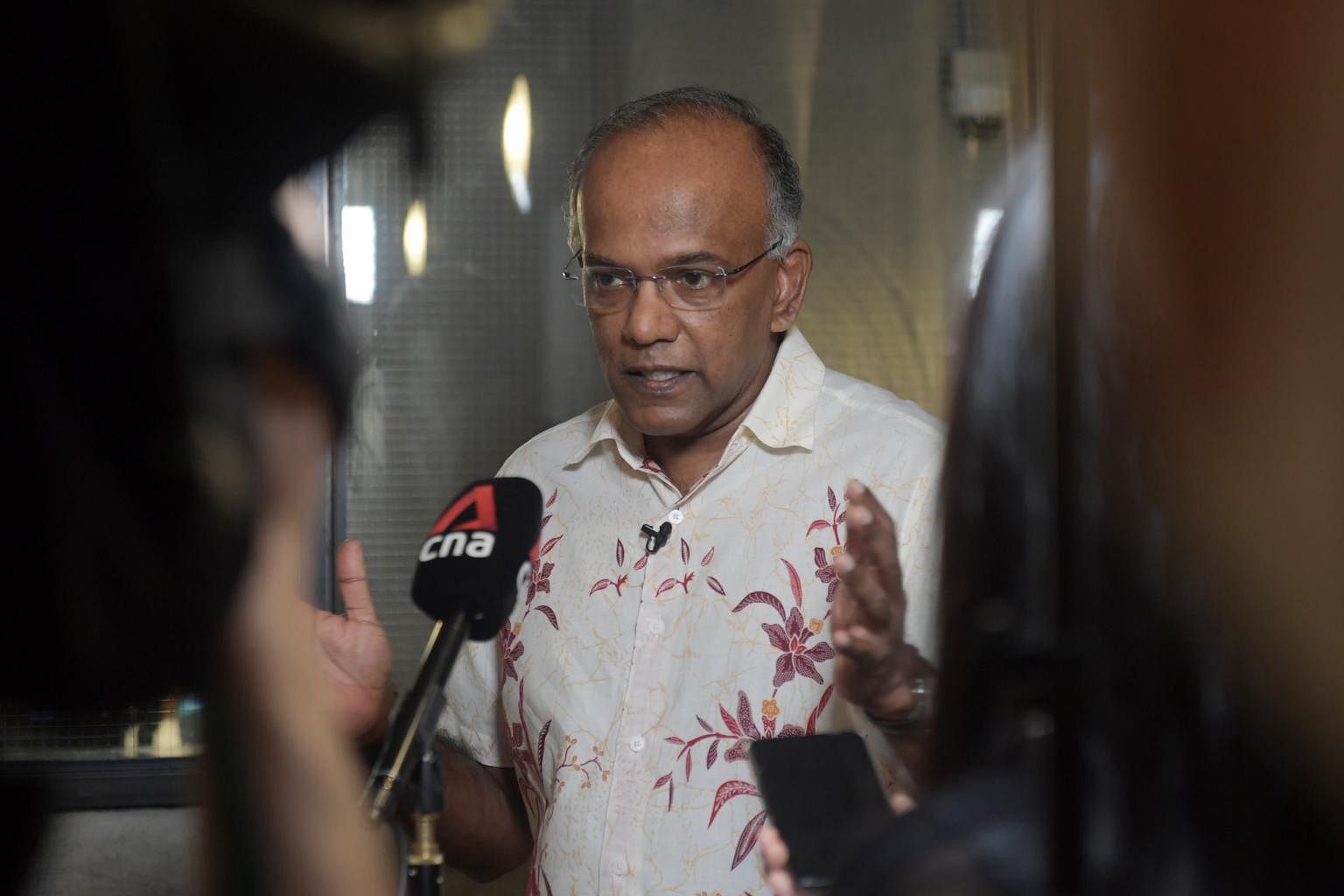UN decision on cannabis driven by 'power of money', not rationality and science: Shanmugam
Sign up now: Get ST's newsletters delivered to your inbox

Law and Home Affairs Minister K. Shanmugam noted that the evidence that cannabis is harmful is quite substantive.
ST PHOTO: ALPHONSUS CHERN
Fabian Koh
Follow topic:
SINGAPORE - The recent decision by the United Nations' drug agency to reclassify cannabis is one driven by money and profits rather than science and rationality, said Law and Home Affairs Minister K. Shanmugam on Saturday (Dec 5).
"It is a decision that concerns us," he said, speaking to the media before the launch of a book on former offenders' rehabilitation journeys.
"I put this down to the power of money. Companies see a huge amount of profit, and a very invidious idea that cannabis is not harmful, is being pushed."
The annual Commission on Narcotic Drugs, the UN Office on Drugs and Crime's governing body, voted on Wednesday to remove cannabis from the most tightly controlled category of narcotic drugs, following the World Health Organisation's recommendation to make research into its medical use easier.
It was a close decision, said Mr Shanmugam, with 27 countries voting to remove cannabis from Schedule IV of the 1961 Single Convention on Narcotic Drugs, a global text governing drug controls, 25 countries voting against, and one abstaining.
However, he noted that the evidence that cannabis is harmful "is quite substantive".
Last year, renowned medical journal Lancet highlighted a greater risk of psychotic disorder from the abuse of cannabis. In the same year, the Surgeon General of the United States pointed out three negative effects of cannabis - it affects learning in adolescents, causes a decline in IQ, and increases the risk of psychotic disorder.
In 2015, Singapore's Institute of Mental Health also studied the literature on the subject and presented its findings to the UN.
"The evidence was quite clear, and I said at the UN, 'Look, if there is evidence that it's not harmful, we will change. But so far, what we have done has worked for us. No one has been able to show me (otherwise)'," said Mr Shanmugam.
He said that it should be doctors and medical associations saying they need the drug for medical purposes, and if so, then "a framework can be worked out, to be given to the patients who need it, with suitable safeguards".
"It shouldn't be profit-driven companies which decide which you buy over the counter, and then say that it is for medical purposes," he said.
He noted that the profit-driven companies are investing huge amounts of money in the cannabis sector. For example, beer company Constellation has spent US$4 billion (S$5.3 billion) since 2017.
Another pharmaceutical firm, Purdue Pharma, pushed oxycontin into the American market and created a huge opioid epidemic in the US. Huge numbers of people were affected, said Mr Shanmugam, but shareholders benefited, as billions of dollars in profit were made.
The firm later got sued and filed for bankruptcy, but it was too late, as the damage was already done, he said.
Mr Shanmugam said: "So the real question is whether policy in this area, should it be done by governments or should it be done by lobbyists and companies?
"In Singapore, we are impervious to such lobbying. We look at what's public interest with a very clear eye, and we take a view. But you know, in other countries that's not the position," he said.
Mr Shanmugam said that the consequences in places where cannabis has been legalised is "concerning".
For example, in the US state of Colorado, it is estimated that for every US$1 received in taxes from the sale of drugs, US$4.50 is spent in dealing with the negative consequences.
There has been an 8 per cent rise in property crimes, an increase of about 19 per cent in other violent crimes, and a 151 per cent surge in deaths arising from accidents related to cannabis.
Mr Shanmugam stressed that "we need to hold the line in Singapore", by persuading the population with rational and scientific arguments, and also trying to persuade the international community.
"I think if it was based on rationality and science, I have no doubt we will succeed. But we are also fighting the power of money in other countries," he said.
Mr Shanmugam added that while the fight against drugs can never be won, Singapore is "one of the few countries in the world where we have dealt with it successfully", with the country being largely drug-free.
He noted that the rising number of first-time drug abusers getting arrested is of concern, with the abuse of new psychoactive substances particularly worrying.
He said that Singapore has moved from dealing with first-time drug offences as a crime, to treating first-time offenders as requiring help.
While the authorities try to wean abusers off drugs, it is the traffickers and "big-time organisers" who are the main targets of crackdowns, said Mr Shanmugam.
"We have managed to have it under control in Singapore, but you need to be constantly on the vigil. And there is a fight internationally as well," he said.
"We need to put forward our position, persuade countries that it is in their public interest, as well as our interest, that we fight this together."
Correction note: An earlier version of this article referred to the UN drug agency's decision as decriminalising or legalising cannabis. Its decision was actually to reclassify cannabis and remove it from the most tightly controlled category of narcotic drugs.

